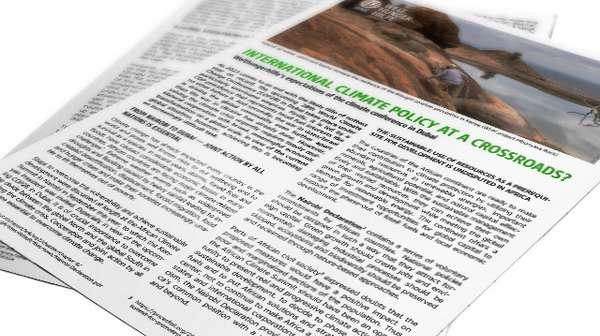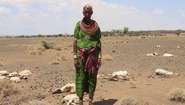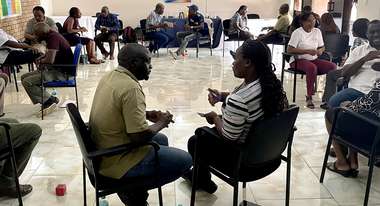Welthungerhilfe's expectations of the climate conference in Dubai
UN Climate Change Conference: Strengthening Cooperation
Welthungerhilfe Calls for Financial Commitments to Be Met

Bonn/Berlin, 20 November 2023. The UN Climate Change Conference in Dubai is taking place under challenging circumstances. For one, the host country is the strongest proponent of fossil-fuel interests yet to play this role; for another, wars and conflicts are currently driving the international community apart. Despite these obstacles, multilateral cooperation is urgently needed at COP28 to support the people who have contributed the least to climate change but are suffering the most.
“No country can solve the climate crisis on its own. Any solution will require global cooperation. To begin with, industrialized countries must keep their 2015 promise to provide USD 100 billion in annual climate funding by 2025, and this amount should increase after that target is met. The current flooding in the Horn of Africa demonstrates the drastic impact of increasingly extreme weather, as a years-long drought, which created hunger and destroyed the livelihoods of millions of people, was followed by torrential rainfall that caused flooding. Instead of fulfilling people’s hopes, the long-awaited rain is now washing them away,” says Michael Kühn, a WHH climate expert.
In Kenya, many internally displaced people lost their seeds and livestock to the floods, and a cholera outbreak is in the making. More than one million people in WHH project regions are affected in Somalia. Their access to food is under threat, and local market prices have risen by 20 percent.
WHH expects the German government to use its platform at COP28 to increase climate funding and to advocate for gaps in current climate policy to be closed, for instance, through ambitious new national climate protection plans and by doubling financing to support the most affected countries in adapting to climate change. The new fund, intended to compensate for the climate-induced losses and damages, must be structured in a way that simplifies access for the most vulnerable countries.
In our latest policy brief, you can read about the issues WHH believes the German government should support at COP28.
Welthungerhilfe (WHH) is one of the largest private aid organizations in Germany and has no political or religious affiliations. It is fighting for “Zero Hunger by 2030”. Since its inception, it has provided funding of EUR 4.75 billion for more than 11,498 overseas projects in 72 countries. WHH follows the principle of supporting people in realizing their rights and sustainably improving their living conditions, which it implements with measures ranging from rapid disaster relief to rehabilitation to long-term development co-operation projects with national and international partner organizations.


















